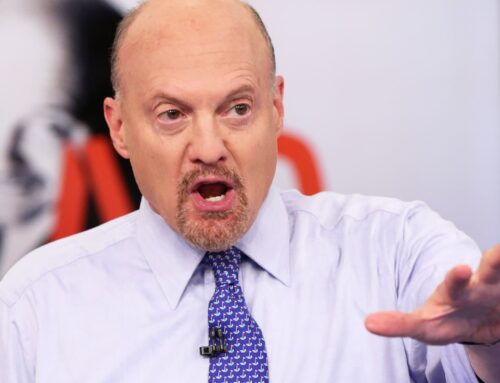Pakistan will deploy Bitcoin reserve in DeFi for yield, says Bilal Bin Saqib
July 1, 2025
Pakistan’s crypto czar Bilal Bin Saqib burst into the headlines in late May by announcing live on stage at Bitcoin 2025 that the country will establish a Bitcoin Reserve.
Saqib, Pakistan’s crypto minister and CEO of the Pakistan Crypto Council, tells Magazine a discussion with Strategy executive chairman Michael Saylor made him feel even more certain about the decision.
Saqib said that while he was already smitten with Bitcoin before, he felt reinvigorated like he’d been orange-pilled all over again.
“It was great. He’s a man of conviction, great for the space, and great for Bitcoin,” the London School of Economics graduate says.
Strategy provides yield to its holders relating to BTC price increases, but Saqib reveals that Pakistan plans to grow its Bitcoin holdings with yield from decentralized finance protocols.
The 34-year-old was so excited by the chat that not long after, he invited Saylor to his motherland.
“We invited him to Pakistan,” he says. Things have moved fast since Vegas.
During a Zoom call in June, Saqib caught up with Saylor again, only this time, he brought along Pakistan’s Finance Minister Muhammad Aurangzeb, and the pair asked Saylor to come on board as an adviser for the nation’s newly adopted Strategic Bitcoin Reserve.
It came only two months after former Binance CEO Changpeng “CZ” Zhao was appointed as an adviser.
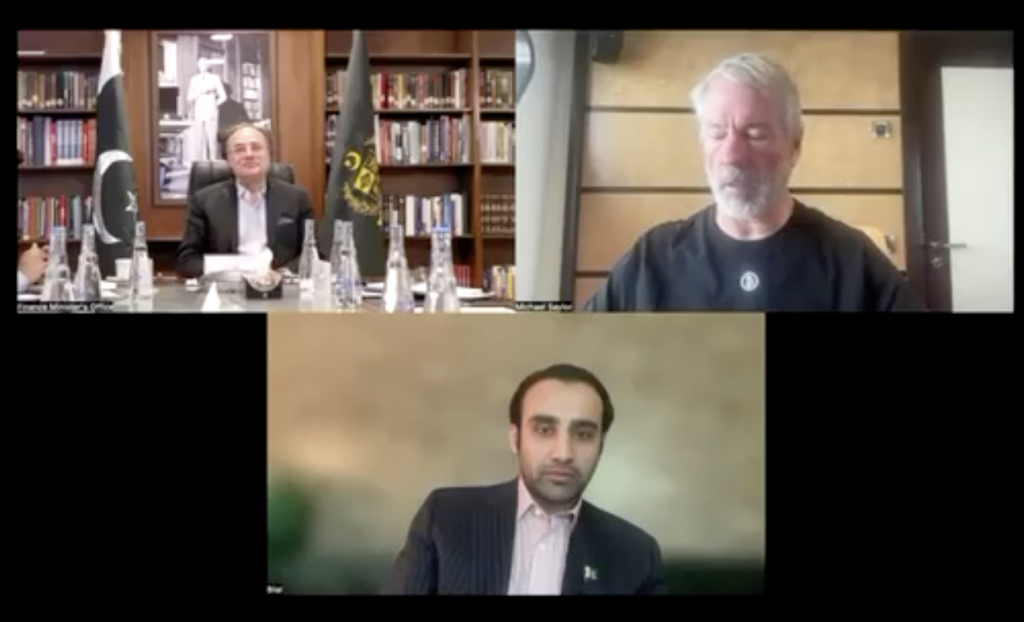
But Saylor wasn’t the only lasting memory that Saqib took from the conference.
Saqib said he also had a memorable chat with crypto venture capitalist and former independent candidate for US President Brock Pierce, along with meeting US policymakers working on crypto legislation.
“I think Bitcoin Vegas wasn’t just a conference. I think it was a statement.”
“It was a gathering of minds who were early adopters, people who believe in financial freedom, people who believe in building a more inclusive economic future,” he says.
“Usually, you would have seen people from the private sector. But as you rightly mentioned, the vice president was there, and there were a lot of government officials,” he adds.
You’d think Saqib would need some downtime after a crazy crypto week in Vegas, but he was already at the White House just a few days later.
On June 4, he met with Robert “Bo” Hines, executive director of US President Donald Trump’s Council on Digital Assets, at the White House.
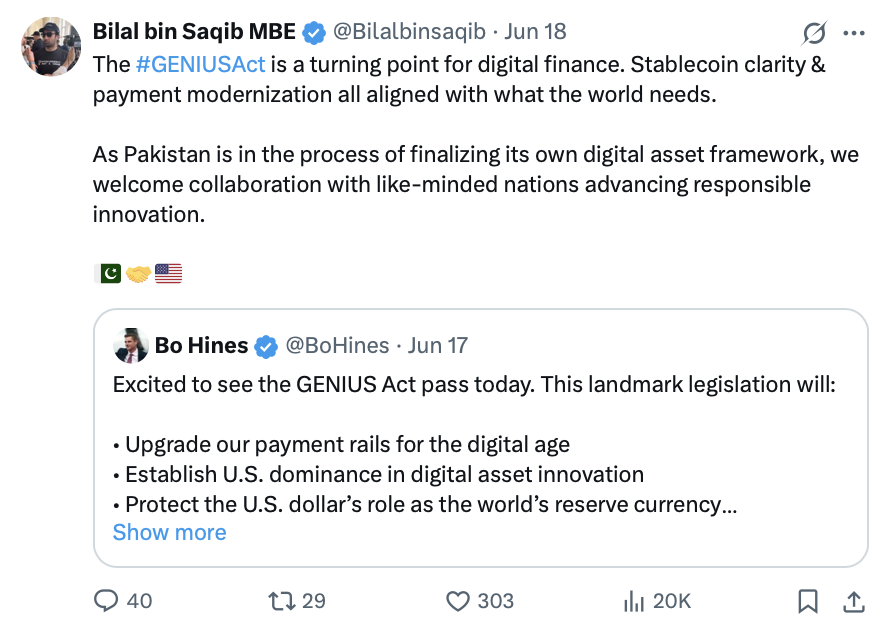
Saqib says it was an honor to represent Pakistan at the White House as a “forward-looking, tech-driven nation unafraid to engage in this new area of finance.”
He spoke to Hines about Bitcoin reserves, stablecoin infrastructure and “building bridges” between US innovation and the Pakistani youth, given that the nation holds the third-largest freelancer market in the world.
“We want to learn on different frameworks from the US, whether it’s on setting up the wallet or the genius coin act,” he says, adding that the two nations will be working very closely regarding knowledge building and knowledge sharing.
“We are looking at the US because they are inspiring, not just us, but the whole world.”
Saqib entered crypto eight years ago, when he launched Web3Pak, Pakistan’s largest crypto community.
Read also
But don’t be fooled; Saqib is far from the typical crypto bro. In 2023, he was honored with an MBE (Member of the Order of the British Empire) from Princess Anne and King Charles, recognizing his work on the One Million Meals initiative in the UK during COVID-19.
In March, he took on the CEO role of Pakistan’s Crypto Council, which has helped streamline crypto initiatives in Pakistan:
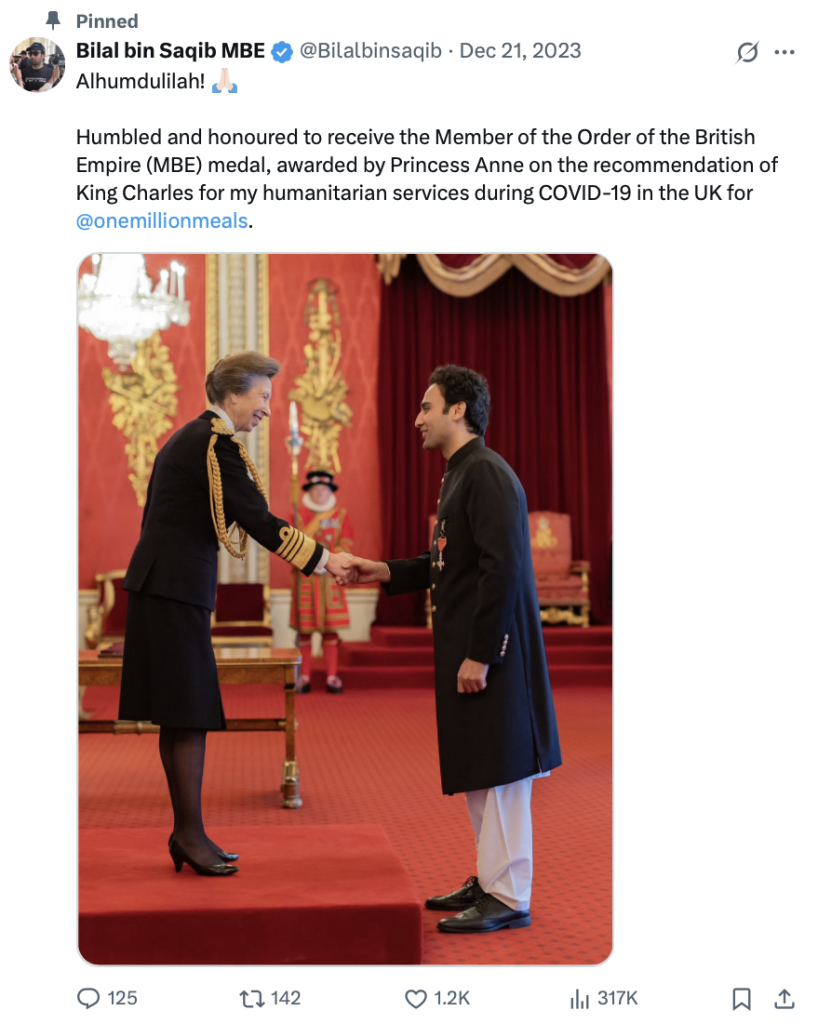
“It became like a single window operation to accelerate crypto in Pakistan because there was work being done in different silos,” he explains.
“We wanted to bring everything under one window operation,” Saqib says. He adds that the council comprises the finance minister, who serves as the council’s chairman, the governor of the state bank, and the SEC chairman.
Just two months later, in May, Saqib got another promotion. Pakistan Prime Minister Shehbaz Sharif appointed Saqib as his special assistant on crypto and blockchain, after announcing his plans for a strategic Bitcoin reserve.
“My role has been elevated as the special assistant to the prime minister on crypto and blockchain, essentially a state minister. I think it is the only ministry in the world right now for crypto and blockchain.”
Like the US, Pakistan’s strategic Bitcoin reserve will use Bitcoin seized from criminal activities, which has been “just sitting idle with the law enforcement agencies.”
Jan3 founder Samson Mow recently told Magazine that the US needs to hurry up and start acquiring Bitcoin for its strategic Bitcoin reserve, or Pakistan may outpace it. But Saqib says the country isn’t an active buyer, either.
Read also
“You know, this is not true. We right now have a budget-neutral policy toward the wallet,” he says.
Saqib says the next move is to set up a wallet for Bitcoin and deploy it on DeFi to generate passive income.
“We will put our Bitcoin on DeFi so we can earn yield on them.”
The country has plans to get into Bitcoin mining, too. In May, the Pakistani government announced that it had allocated 2,000 megawatts of surplus electricity exclusively for Bitcoin mining and artificial intelligence centers.
“All of this has been put together because there is a lot of political will to push this through and to make sure that Pakistan leads when it comes to digital assets in emerging economies.”
“We want to take it slowly in a very risk-mitigated way,” he adds. The nation’s efforts have not gone unnoticed by the rest of the world. Pakistan ranked 9th in Chainalysis’ 2024 Global Crypto Adoption Index.
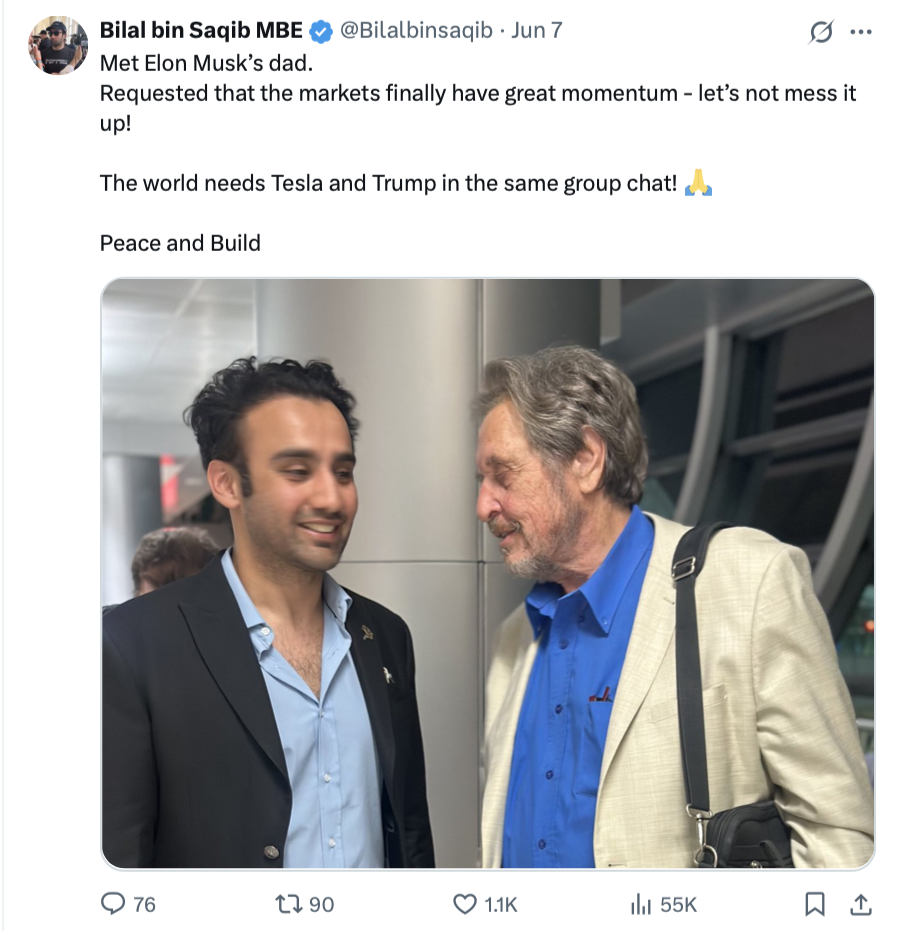
Saqib is now advocating for today’s youth to do their part by orange-pilling their respective nation’s political leaders, adding that, unfortunately, boomer politicians are still stuck in their old-school views on crypto.
“I think the only problem is that people in power, because of their age, have not really interacted with this ecosystem, and hence why they are too distant,” he says.
“It’s easier to just say no, and nobody went to jail for using Microsoft Office, so they want to play it safe.”
Saqib urges every country in the world to implement a digital assets committee. “This is the reality. This is the fastest-growing industry,” he says.
“The youth in other countries should definitely canvas, lobby, and pressure their decision makers to believe that this is the future of finance, and they should make sure that they are not left behind,” he says.
BitcoinCryptocurrenciesMichael SaylorPakistan
Read also
Is measuring blockchain transactions per second (TPS) stupid in 2024? Big Questions
by
Felix Ng
9 min
March 6, 2024
Does it still make sense to benchmark blockchains using transactions per second (TPS), or are there smarter alternatives in 2024?
We tracked down the original Bitcoin Lambo guy
by
Elias Ahonen
9 min
June 4, 2021
“I had issues with some Russian oligarchs in the past, but I don’t think I’m a target now.”
Search
RECENT PRESS RELEASES
Related Post




